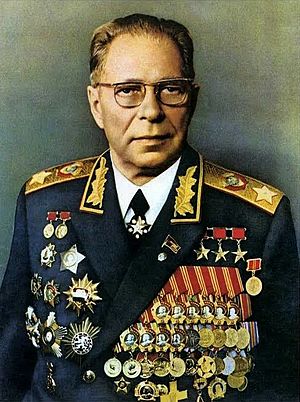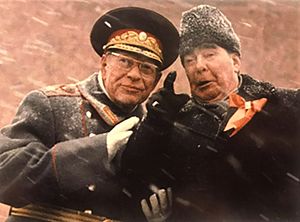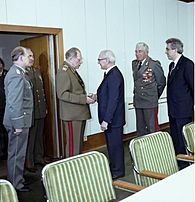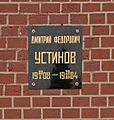Dmitry Ustinov facts for kids
Quick facts for kids
Marshal of the Soviet Union
Dmitriy Ustinov
|
|
|---|---|
| Дмитрий Фёдорович Устинов | |

Ustinov in 1978
|
|
| Minister of Defence Union of Soviet Socialist Republics |
|
| In office 12 October 1974 – 20 May 1983 |
|
| Premier | Alexei Kosygin Nikolai Tikhonov |
| Preceded by | Andrei Grechko |
| Succeeded by | Sergei Sokolov |
| First Deputy Chairman of the Council of Ministers of the Soviet Union |
|
| In office 13 March 1963 – 26 March 1965 |
|
| Premier | Nikita Khrushchev Alexei Kosygin |
| Preceded by | Alexei Kosygin |
| Succeeded by | Kirill Mazurov |
| Minister of Armament Union of Soviet Socialist Republics |
|
| In office 6 June 1941 – 6 March 1953 |
|
| Premier | Joseph Stalin |
| Preceded by | Boris Vannikov |
| Succeeded by | Position abolished |
| Full member of the 25th, 26th Politburo of the Communist Party of the Soviet Union | |
| In office 5 March 1976 – 20 December 1984 |
|
| Candidate member of the 20th–21st, 22nd, 23rd, 24th Politburo of the Communist Party of the Soviet Union | |
| In office 8 April 1966 – 5 March 1976 |
|
| In office 25 March 1965 – 29 March 1966 |
|
| Member of the 22nd, 23rd, 24th, 25th Secretariat of the Communist Party of the Soviet Union | |
| In office 26 March 1965 – 26 October 1976 |
|
| Personal details | |
| Born | 17 October 1908 Samara, Russian Empire |
| Died | 20 December 1984 (aged 76) Moscow, Russian SFSR, Soviet Union |
| Nationality | Soviet |
| Political party | Communist Party of the Soviet Union (1927–1984) |
| Profession | Mechanical engineer |
| Awards | Hero of the Soviet Union Hero of Socialist Labour (twice) |
| Military service | |
| Allegiance | |
| Branch/service | Soviet Armed Forces |
| Years of service | 1941–1984 |
| Rank | |
| Battles/wars | World War II Soviet–Afghan War |
Dmitriy Fyodorovich Ustinov (Russian: Дми́трий Фёдорович Усти́нов; October 30, 1908 – December 20, 1984) was a powerful Marshal of the Soviet Union and a Soviet politician. He was a key figure during the Cold War. From 1965 to 1976, he was in charge of the Soviet Union's military factories. Later, from 1976 until his death in 1984, he served as the Minister of Defence.
Ustinov was born in 1908 in Samara, Russia, into a working-class family. He joined the Communist Party in 1927 and then studied engineering. After graduating in 1934, he worked as an engineer. By 1937, he became the director of a large arms factory. During World War II, he was the People's Commissar of Armaments. He was praised for moving many factories from Leningrad to the Ural Mountains to keep them safe. After the war, he helped the Soviet Union get German missile technology.
Under Leonid Brezhnev's leadership, Ustinov became a very important person in the Communist Party. He was given the job of managing the Soviet Union's defense industry and its armed forces. In 1976, he became the Minister of Defence and was given the highest military rank, Marshal of the Soviet Union. Ustinov believed in a strong military and supported building up Soviet weapons. This belief guided his country's defense plans until he passed away in 1984.
Contents
Early Life and Education
Dmitry Feodorovich Ustinov grew up in a working-class family in Samara. During the Russian Civil War, his family faced great hardship. His father died in 1922, and his mother passed away in 1925.
In 1927, Ustinov joined the Communist Party. He began studying engineering in 1929. He later attended the Institute of Military Mechanical Engineering in Leningrad, graduating in 1934. After that, he worked as an engineer at a marine research institute. By 1937, he moved to the "Bolshevik" Arms Factory, where he eventually became its director.
World War II Service
When Nazi Germany invaded the Soviet Union in June 1941, Joseph Stalin appointed 32-year-old Ustinov as the People's Commissar of Armaments. His main job was to move defense factories from the city of Leningrad, which was under attack, to the Ural Mountains in the east.
He successfully moved over 80 military factories. More than 600,000 workers, technicians, and engineers were part of this huge effort. Stalin was very impressed and gave Ustinov the highest civilian award, Hero of Socialist Labour. After the war, Ustinov helped the Soviet Union get important missile technology from Germany. This helped kickstart the Soviet missile and space programs.
After the War
In 1952, Ustinov became a member of the Central Committee, a powerful group in the Communist Party. After Stalin died in 1953, Ustinov became the head of the new Ministry of Defense Industry. This ministry combined the armaments and aviation industries. In 1957, he was made a Deputy Premier of the Soviet Union. He also became the chairman of the Military-Industrial Commission. This meant he was in charge of all military production.
Becoming a Soviet Leader

When Leonid Brezhnev became the leader, Ustinov continued to work in the defense industry. In 1965, Brezhnev made Ustinov a candidate member of the Politburo. This was a very important group that made major decisions. Ustinov was also put in charge of developing the Soviet Union's long-range bombers and missiles. He was known in the defense industry as "Uncle Mitya." He also helped push forward the development of the Salyut space station.
Ustinov became more and more powerful as he rose through the ranks of the defense industry.
Minister of Defence
In 1976, after the previous Defence Minister, Andrei Grechko, passed away, Ustinov took over the role. He was promoted to General of the Army and then quickly to the highest military rank, Marshal of the Soviet Union. This was unusual because he had not served in the military before.
Ustinov worked with Marshal Nikolai Ogarkov to improve and modernize the Soviet military. He believed that the Soviet armed forces were strong enough to handle any challenges.
Ustinov became very influential in the Kremlin. His support helped Yuri Andropov become the leader after Brezhnev. He also had a lot of influence during Konstantin Chernenko's time as leader.

In 1979, the leader of Afghanistan, Nur Muhammad Taraki, was removed from power. Ustinov and Yuri Andropov strongly supported Soviet military action in Afghanistan. They were concerned about the United States' presence in the Persian Gulf. On December 12, 1979, the Politburo approved their plan. On December 24, 1979, Soviet troops entered Afghanistan.
In the early 1980s, the United States developed its Space Shuttle program. This worried the Soviet defense industry. Ustinov received reports that the US Shuttle could be used to put nuclear missiles in space. Because of this concern, Ustinov made the development of the Soviet Buran Shuttle a top priority.
Death and Legacy
On November 7, 1984, Ustinov was too ill to lead the annual military parade on Red Square. He had caught pneumonia in late October. He had surgery for a heart problem, but his health got worse. He died on December 20, 1984, from heart failure. He was given a state funeral, and his ashes were buried in the Kremlin Wall Necropolis.
Several things were named in his honor. The RFS Marshal Ustinov is a Russian warship. The Baltic State Technical University in Saint Petersburg was renamed the Ustinov Baltic State Technical Military-Mechanical University. The city of Izhevsk was also named after him from 1984 to 1987. However, under Mikhail Gorbachev, cities named after recent Soviet leaders were changed back to their original names.
Ustinov believed the military was very important. He made sure the Soviet Union's ICBMs were always up-to-date. He also wrote several books, including "Selected Speeches and Articles" and "To serve my country - the cause of Communism."
Personality and Family
Mikhail Gorbachev described Ustinov as an energetic and positive person. When Gorbachev faced challenges, Ustinov encouraged him to "stand firm."
Colonel General Igor Illarionov, who worked with Ustinov for 30 years, said Ustinov was very dedicated to his work. He often worked late into the night and slept only a few hours during the day.
Academician Yevgeniy Chazov, a doctor who knew Ustinov, described him as having strong willpower, quick decision-making skills, and optimism. Chazov felt Ustinov represented the strong leaders who helped the Soviet Union win World War II. However, Chazov believed Ustinov's biggest mistake was the war in Afghanistan. He thought Ustinov, like older leaders, believed all problems could be solved with military strength.
Ustinov was not always open to new ideas. He often disagreed with Marshal Nikolai Ogarkov, the Chief of the General Staff. Ogarkov wanted to make the Soviet military smaller and use more high-tech weapons. Ustinov, however, preferred to focus on a large number of soldiers and nuclear weapons. Even though Ustinov greatly improved the technology of the Soviet armed forces, most of these improvements were for nuclear weapons, like the Typhoon-class submarine and the Tu-160 bomber.
Ustinov was married to Taisa Alekseevna Briekalova-Ustinova. They had a daughter, Vera, and a son, Nikolai.
Awards and Honours
Soviet Awards
- Hero of the Soviet Union
- Hero of Socialist Labor, twice (1942, 1961)
- Order of Lenin, 11 times
- Order of Suvorov, 1st class (1945)
- Order of Kutuzov, 1st class (1944)
- Lenin Prize (1982)
- Stalin Prize, 1st class (1953)
- USSR State Prize (1983)
- Many campaign and jubilee medals
Foreign Awards
- Mongolian People's Republic:
- Hero of the Mongolian People's Republic (1981)
- Order of Sukhbaatar, three times
- Czechoslovakia:
- Hero of the Czechoslovak Socialist Republic (1982)
- Order of Klement Gottwald, twice
- Vietnam:
- Order of Ho Chi Minh (1983)
- Bulgaria:
- Order of Georgi Dimitrov, twice
- Poland:
- Cross of Grunwald, 1st class (1976)
- Hungary:
- Order of the Flag of the Republic of Hungary with rubies, twice
- Afghanistan:
- Order of the Sun of Liberty (1982)
- East Germany:
- Order of Karl Marx, twice
- Scharnhorst Order (1977)
- Finland:
- Order of the White Rose, 1st class (1978)
- Cuba:
- Order of Playa Girón (1983)
Images for kids
-
Kremlin Wall Necropolis - grave of Ustinov
See also
 In Spanish: Dmitri Ustínov para niños
In Spanish: Dmitri Ustínov para niños



